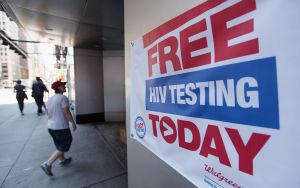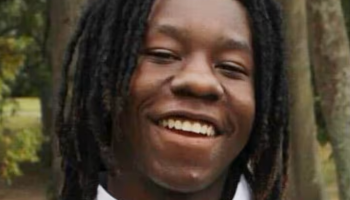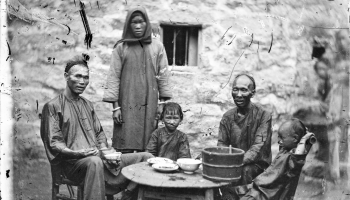
Source: Mario Tama / Getty
The headline is as frightening as it sounds: “Half Of Atlanta’s Newly Diagnosed HIV Patients Have AIDS, Grady Testing Finds.”
Yet, what may sound like an isolated problem is a complicated issue whose faults are multidimensional and could easily pour over into other major metropolitan cities. If they haven’t already.
As NPR’s Lisa Hagen reports, Atlanta finds itself the number five ranked city when it comes to new diagnoses of HIV — a statistic that is rooted in HIV testing not being offered in places where most people get access to health care. Moreover, this has spurred nearly one-third of those diagnosed having clinical AIDS. Grady Hospital has only started its routine testing program in 2013, but as Hagen notes, an average of two to three patients are diagnosed with HIV each day of the week.
Dr. Abigal Hankin-Wei said: “This is something that keeps me awake at night in Atlanta. When we diagnose patients with HIV, the first time we are telling them they’ve been infected with HIV, we know that among our patients at Grady, nearly half of them have AIDS the day we diagnose them.”
Grady Hospital is the only emergency department in Atlanta that offers an HIV test to every patient regardless of why they are in need of care. Part of that speaks to Georgia’s Republican Governor Nathan Deal refusing to expand Medicaid in the state, which put poorer hospitals at risk and also meant that more than half a million poorer Georgia residents would go without healthcare. At the time, Deal complained that Georgia couldn’t afford the expansion.
Can Georgia afford this sort of health crisis?
With the start of every Republican presidential primary season comes candidates’ invocation of the GOP’s patron saint of conservatism, Ronald Reagan. Reagan’s failures as president are numerous, but one of his most notable blunders as president was his failure to properly address AIDS. However, things have changed since then. HIV/AIDS is no longer synonymous with just gay men, nor does the disease have to equate a death sentence.
Nonetheless, an abdication of leadership can make any matter more complicated than it needs to be. So blame goes to Governor Deal. The same can be said of other health agencies. I couldn’t help but read into this statistic and think of The New York Times’ 2013 report about poor Black and Latino men who have sex with men becoming the face of HIV/AIDS partially due to there being a lack of model on how to reach these men about preventive measures.
There has to be a will to fight HIV/AIDS for all people. This is evidence that needs to be done in the way of meeting that goal.
Even so, Dr. Hankin-Wei’s interview with Atlanta’s 90.1. FM does suggest the role of personal responsibility and lingering stigmas about HIV/AIDS in our communities play a significant part. There are at least 50 places you can get tested in the Atlanta area, and as Dr. Hankin-Wei explains, “Despite that, there are patients who aren’t going to get those tests. And they aren’t going for a decade.”
I am not shifting the onus on the newly diagnosed; only that we — myself included, as I’ve written openly about my initial introduction to the disease giving way to unnecessary paranoia — to educate each other and be better about awareness. To remove stigmas. To push ourselves to be smarter, safer, and self-aware.
The likes of Governor Deal ought to be doing more, and arguably, more than most, but we still have to play our part. This is a solvable issue. It should have never gotten to this point. Now’s the time to make sure it does not worsen.
Michael Arceneaux hails from Houston, lives in Harlem, and praises Beyoncé’s name wherever he goes. Follow him @youngsinick.
























